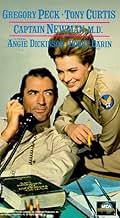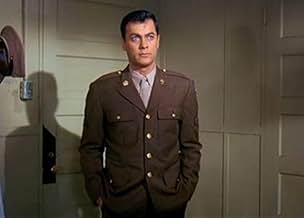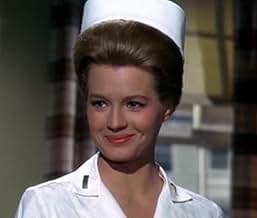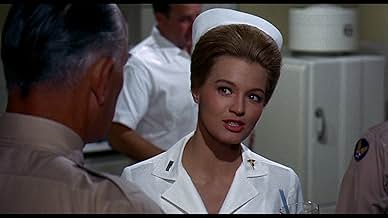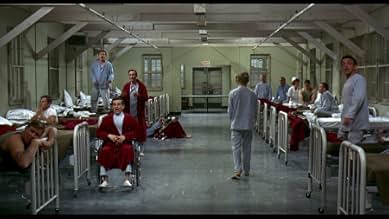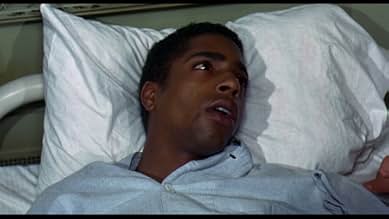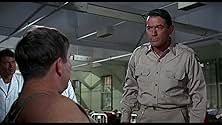IMDb RATING
6.9/10
3.1K
YOUR RATING
In 1944, an Army doctor is in charge of a neuropsychiatric ward at an Army Air Corps hospital in Arizona, and he must deal with a variety of tough cases.In 1944, an Army doctor is in charge of a neuropsychiatric ward at an Army Air Corps hospital in Arizona, and he must deal with a variety of tough cases.In 1944, an Army doctor is in charge of a neuropsychiatric ward at an Army Air Corps hospital in Arizona, and he must deal with a variety of tough cases.
- Nominated for 3 Oscars
- 10 nominations total
Charlie Briggs
- Gorkow
- (as Charles Briggs)
Featured reviews
Captain Newman, M.D. (1963)
Almost twenty years after WWII, a movie that reflected the growing public admission that there were many psychological victims from the war, often ignored or minimized at the time (unlike, say, Vietnam, which was just unfolding, and which demanded a different kind of accountability). And this one is set in the middle of the war, though in an Arizona military hospital far from direct action.
The star is certainly the title character, played by Gregory Peck, and Peck is his usual highly respectable self, moral and a natural leader, but likable and willing to take chances, too. That is, an ideal male, in many ways, the kind you might like to have as President, or at least the chief doctor in your hospital. He is, in particular, in charge of the mental ward, and his main intern played by Tony Curtis steals the show, on purpose. While much of the movie is funny, or at least peculiar enough to be ironic and wry, there are moments of heartfelt tragedy and even heartwrenching trauma (especially when a couple of the inmates go berserk). Third in line is a strong, sympathetic nurse (Angie Dickinson) and these three run the ward with unusual verve and intelligence. It clearly is a case in favor of the military giving good psych treatment.
There are several interesting patients, as well as a band of Italian POWs brought in for some nice comic relief (and for a reminder that people are people, even if they are enemies). The most famous and unusual is played by Bobby Darin, who I just saw in another movie from the period where he played a patient in an army psych ward, the riveting "Pressure Point." This is a whole different kind of movie, though Darin's performance is strong in similar ways in both cases. Here he even plays an impressive ten seconds on the guitar, and if you watch closely you'll see it's the real deal, not recorded later.
The color in the filming is unusually clear and vivid in a realistic way, and Russell Metty behind the camera has made a number of really solid, beautiful, richly colorful films ("That Touch of Mink" and "Imitation of Life" as well as the more earthy "The Misfits"). The lighting is usually fairly bright and broad, though there are some scenes pumped up with shadows. A couple of shots toward the end are oddly filmed against an obvious back projections (when they are rounding up the sheep) which is too bad because otherwise the standards are very high. Director David Miller isn't especially legendary, but he has one terrific film I'd recommend to anyone, "Sudden Fear" made a decade earlier. Here he shows general high production values and a sense of humor (mostly through the endlessly lively Curtis).
A nice little colorful film with a gently persuasive subtext.
Almost twenty years after WWII, a movie that reflected the growing public admission that there were many psychological victims from the war, often ignored or minimized at the time (unlike, say, Vietnam, which was just unfolding, and which demanded a different kind of accountability). And this one is set in the middle of the war, though in an Arizona military hospital far from direct action.
The star is certainly the title character, played by Gregory Peck, and Peck is his usual highly respectable self, moral and a natural leader, but likable and willing to take chances, too. That is, an ideal male, in many ways, the kind you might like to have as President, or at least the chief doctor in your hospital. He is, in particular, in charge of the mental ward, and his main intern played by Tony Curtis steals the show, on purpose. While much of the movie is funny, or at least peculiar enough to be ironic and wry, there are moments of heartfelt tragedy and even heartwrenching trauma (especially when a couple of the inmates go berserk). Third in line is a strong, sympathetic nurse (Angie Dickinson) and these three run the ward with unusual verve and intelligence. It clearly is a case in favor of the military giving good psych treatment.
There are several interesting patients, as well as a band of Italian POWs brought in for some nice comic relief (and for a reminder that people are people, even if they are enemies). The most famous and unusual is played by Bobby Darin, who I just saw in another movie from the period where he played a patient in an army psych ward, the riveting "Pressure Point." This is a whole different kind of movie, though Darin's performance is strong in similar ways in both cases. Here he even plays an impressive ten seconds on the guitar, and if you watch closely you'll see it's the real deal, not recorded later.
The color in the filming is unusually clear and vivid in a realistic way, and Russell Metty behind the camera has made a number of really solid, beautiful, richly colorful films ("That Touch of Mink" and "Imitation of Life" as well as the more earthy "The Misfits"). The lighting is usually fairly bright and broad, though there are some scenes pumped up with shadows. A couple of shots toward the end are oddly filmed against an obvious back projections (when they are rounding up the sheep) which is too bad because otherwise the standards are very high. Director David Miller isn't especially legendary, but he has one terrific film I'd recommend to anyone, "Sudden Fear" made a decade earlier. Here he shows general high production values and a sense of humor (mostly through the endlessly lively Curtis).
A nice little colorful film with a gently persuasive subtext.
This a serious and Harrowing tale of the psychological traumas suffered by American Servicemen .. and Gregory Peck as the struggling Doctor trying to mend damaged minds.. I find it difficult to understand why this Film has been categorised as 'Comedy' when clearly it isn't..!! Especially Bobby Darrin, delivers an outstanding performance as Corporal Jim Tompkins .. I would put this film up there with to 'To Kill a Mocking Bird ' -an outstanding performance from Gregory Peck .. There is NO comedy in this film .. the film deals direcly with the consequences of Horror in Warfare.. especially the Psychological trauma of the soldiers who survive, when they have witnessed the death of their buddies at first hand.. A film way before it's time .. -this is NOT a comedy.. but a deeply moving, serious film..
I enjoyed the movie very much. Of course I am one of those baby boomer's born after World War II. So I and my siblings would play war (those were the days when parents would remind their charges that movies were make believe). So being 12 years old at the time, "Captain Newman, M.D." was one of the few adult films that I as a kid that I enjoyed and understood. Even being that young I had for the most part enjoyed, Gregory Peck, Tony Curtis, Bobby Darin and Eddie Albert in their respective rolls. I felt for Eddie's character as a Colonel Norval Algate Bliss. Having sent his people out to death, it was a memory his character could not live with. To me, he played the character well, not just acting, but because he had "been there, done that" and so he had seen his share of death during World War II at Tarawa. I would recommend this movie to anyone who enjoys acting at its best.
It's 1944 and Capt. Josiah J. Newman (Gregory Peck) is in charge of the military neuropsychiatric ward. Other staff includes Cpl. Jake Leibowitz (Tony Curtis) and nurse Lt. Francie Corum (Angie Dickinson).
The military is resistant to Newman and his views on PTSD. He is challenged at every turn. The movie itself was probably at the cutting edge in 1963. The movie was filmed 10 years after the end of the Korean war, and that usually is when the Hollywood reflection movies start to be made. The acting is still movie versions of crazy in today's terms. But it was probably a good improvement on a realistic look at mental illness at the time.
The military is resistant to Newman and his views on PTSD. He is challenged at every turn. The movie itself was probably at the cutting edge in 1963. The movie was filmed 10 years after the end of the Korean war, and that usually is when the Hollywood reflection movies start to be made. The acting is still movie versions of crazy in today's terms. But it was probably a good improvement on a realistic look at mental illness at the time.
Uh, Hello!? Bobby Darin was nominated for Best Supporting Actor for his amazing portrayal of shell-shocked airman Jim Tompkins in this great film. (The script and sound were also nominated). And what a cast, Gregory Peck, Angie Dickenson, Tony Curtis, Robert Duvall and Eddie Albert (as the psychotic Col. Bliss), along with a great cast of fine character actors: Larry Storch, Jane Withers, Dick Sergeant and Vitto Scotti. The acting, music, casting and direction are just right. It's one of the first films to deal with we now call Traumatic Stress Disorder in a thoughtful way. Hey, if you don't like this movie
you don't know movies. Great stuff.
Did you know
- TriviaAuthor Leo Rosten based the character of Captain Josiah Newman on his friend, Captain Ralph Greenson, a U.S. Army psychiatrist who worked with traumatized airmen during World War II, and was one of the first to identify the symptoms of Post-Traumatic Stress Disorder following combat.
- GoofsEven though the story is taking place in 1944, hairstyles, uniforms and clothes are from 1963.
- Quotes
Capt. Josiah J. Newman, MD: You mustn't confuse sadness with depression, "professor."
Cpl. Jackson 'Jake' Leibowitz: Is there any difference? Can a man look sad and still be happy?
Capt. Josiah J. Newman, MD: Yes.
Cpl. Jackson 'Jake' Leibowitz: Example?
- ConnectionsFeatured in Biography: Bobby Darin: I Want to Be a Legend (2001)
- SoundtracksJingle Bells
Written by James Pierpont (uncredited)
Performed by Tony Curtis and the people from the Hospital
- How long is Captain Newman, M.D.?Powered by Alexa
Details
- Runtime2 hours 6 minutes
- Color
- Aspect ratio
- 1.85 : 1
Contribute to this page
Suggest an edit or add missing content

Top Gap
By what name was Le combat du Capitaine Newman (1963) officially released in India in English?
Answer

